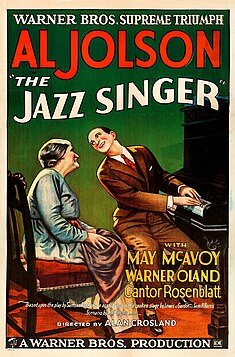
The Jazz Singer is a 1927 American musical drama film directed by Alan Crosland. It is notable as the first feature-length motion picture with both synchronized recorded music score as well as lip-synchronous singing and speech. Its release heralded the commercial ascendance of sound films and effectively marked the end of the silent film era. It was produced by Warner Bros. with the Vitaphone sound-on-disc system and features six songs performed by Al Jolson. Based on the 1925 play of the same name by Samson Raphaelson, the plot was adapted from his short story "The Day of Atonement".

The Jolson Story is a 1946 American musical biography film which purports to tell the life story of singer Al Jolson. It stars Larry Parks as Jolson, Evelyn Keyes as Julie Benson, William Demarest as his manager, Ludwig Donath and Tamara Shayne as his parents, and Scotty Beckett as the young Jolson.

The Singing Fool is a 1928 American musical drama Part-Talkie motion picture directed by Lloyd Bacon which was released by Warner Bros. The film stars Al Jolson in blackface and is a follow-up to his previous film, The Jazz Singer. It is credited with helping to cement the popularity of American films of both sound and the musical genre.
"Back in Your Own Backyard" is a popular song. Officially the credits show it as written by Al Jolson, Billy Rose, and Dave Dreyer; in fact, Billy Rose was exclusively a lyricist, Dreyer a composer, and Al Jolson a performer who was often given credits so he could earn some more money, so the actual apportionment of the credits would be likely to be music by Dreyer, lyrics by Rose, and possibly some small contribution by Jolson.

"Swanee" is an American popular song written in 1919 by George Gershwin, with lyrics by Irving Caesar. It is most often associated with singer Al Jolson.
"I'm Sitting on Top of the World" is a popular song with music written by Ray Henderson and lyrics by Sam M. Lewis and Joe Young. It was published in 1925. It is now in the public domain.
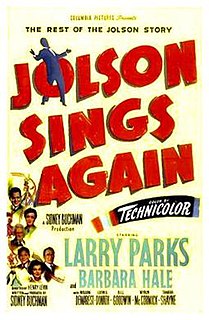
Jolson Sings Again is a 1949 American musical biographical film directed by Henry Levin, and the sequel to The Jolson Story (1946), both of which cover the life of singer Al Jolson. It was the highest-grossing film of 1949 and received three Oscar nominations at the 22nd Academy Awards.

"Rock-a-Bye Your Baby with a Dixie Melody" is a popular song written by Jean Schwartz, with lyrics by Sam M. Lewis and Joe Young. The song was introduced by Al Jolson in the Broadway musical Sinbad and published in 1918.
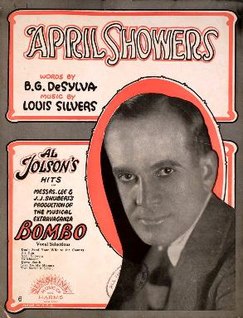
"April Showers" is a popular song with music written by Louis Silvers and lyrics by B. G. De Sylva. First published in 1921, it is one of many popular songs whose lyrics use a "Bluebird of happiness" as a symbol of cheer.

Rose of Washington Square is a 1939 American musical drama film, featuring the already well-known popular song with the same title. Set in 1920s New York City, the film focuses on singer Rose Sargent and her turbulent relationship with con artist Barton DeWitt Clinton, whose criminal activities threaten her professional success in the Ziegfeld Follies.

Say It With Songs is a 1929 American Pre-Code musical drama film, directed by Lloyd Bacon and released by Warner Bros.. The film stars Al Jolson and was a follow-up to his previous film, The Singing Fool (1928).
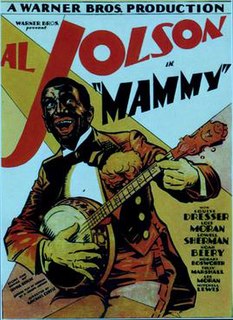
Mammy (1930) is an American pre-Code musical drama film with Technicolor sequences, released by Warner Bros. The film starred Al Jolson and was a follow-up to his previous film, Say It with Songs (1929). Mammy became Al Jolson's fourth feature, following earlier screen efforts as The Jazz Singer (1927), The Singing Fool (1928) and Say It with Songs (1929). The film relives Jolson's early years as a minstrel man. The songs were written by Irving Berlin, who is also credited with the original story titled Mr. Bones.
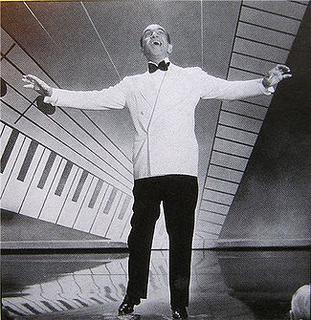
Wonder Bar is a 1934 American pre-Code film adaptation of a Broadway musical of the same name directed by Lloyd Bacon with musical numbers created by Busby Berkeley.
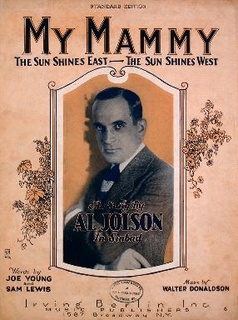
"My Mammy" is an American popular song with music by Walter Donaldson and lyrics by Joe Young and Sam M. Lewis.

Al Jolson was an American singer, comedian, actor, and vaudevillian. Self-billed as "The World's Greatest Entertainer", Jolson is credited with being America's most famous and highest-paid star of the 1920s. He was known for his "shamelessly sentimental, melodramatic approach", and for popularizing many of the songs he performed. Jolson has been referred to by modern critics as "the king of blackface performers".
"For Me and My Gal" is a 1917 popular standard song by George W. Meyer with lyrics by Edgar Leslie and E. Ray Goetz. Popular recordings of the song in 1917 were by Van and Schenck; Prince's Orchestra; Henry Burr and Albert Campbell; and by Billy Murray.
Liza " is a song composed by George Gershwin with lyrics by Ira Gershwin and Gus Kahn. It was introduced in 1929 by Ruby Keeler in Florenz Ziegfeld's musical Show Girl. The stage performances were accompanied by the Duke Ellington Orchestra. On the show's opening night in Boston on June 25, 1929, Keeler's husband and popular singer Al Jolson suddenly stood up from his seat in the third row and sang a chorus of the song, much to the surprise of the audience and Gershwin himself. Jolson recorded the song a few days later on July 6, 1929, and his rendition rose to number nine on the charts of the day.
"The Spaniard That Blighted My Life" is a comic song which was composed and first performed by English music-hall performer Billy Merson.
Bing Crosby Sings with Al Jolson, Bob Hope, Dick Haymes and the Andrews Sisters is a Bing Crosby Decca Records studio 78rpm album of phonograph records featuring Crosby with several of Decca's top artists.
Toot, Toot, Tootsie is a 1922 song with music and lyrics by Gus Kahn, Ernie Erdman and Danny Russo, per the credits on the original sheet music cover. Some other sources also credit Ted Fio Rito and Robert King for the song, but make no mention of Dan Russo. It debuted in the Broadway musical Bombo, where it was a major hit. It was first recorded by Al Jolson with Frank Crumit's orchestra for Columbia Records on September 9, 1922. It was further popularised by Eddie Cantor, nicknamed "Banjo Eyes".












